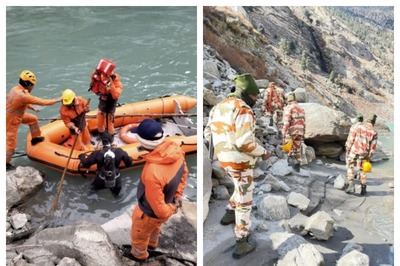
views
Washington: The US is expanding its advising services for Indian students to make sure they do not fall for "misleading offers" from dubious institutions and is also keen to encourage more American students to enroll in varsities in India, Secretary of State Hillary Clinton said on Thursday.
Addressing the first ever India-US Higher Education Summit at the prestigious Georgetown University in Washington, Hillary said the US wants the relationship between the two "great democracies" to be as interconnected as possible at every level and not just at the government to government level, which is just the beginning and "clearly not the most important of lasting collaboration that we seek."
While 100,000 Indians are currently studying at various US universities, "we want to see more American students enrolling for academic credit at Indian institutions".
"The US government is fully committed to enhancing this academic cooperation," she said.
Hillary said the US is also expanding its education USA advising services for Indians and families to provide accurate information about opportunities to study here and help students "sort out misleading offers that come over the Internet."
She said those offers flood into homes across India giving young Indian students the idea that certain approaches will work for them when in fact it is a "dead end".
"We don't want to see that happen. We want to see real exchanges with credible institutions and we will do everything we can to support that."
Early this year, the Tri Valley University in California shut down after an alleged immigration scam, putting the future of a large number of Indian students in jeopardy.
Hillary said the two countries will continue to facilitate dialogues like the education summit to deepen cooperation as there is opportunity for greater collaboration between India and the US in the field.
Minister for Human Resources Development Kapil Sibal said the two countries have to enhance cooperation in the education sector as solutions to world problems like food security and climate change will come through such cooperation between the academia.
She urged the academia, business leaders, faculty and private sector to engage in greater dialogue and explore ways to strengthen the education cooperation and research. She said participants at the summit should "brainstorm" and consider no idea off limits and no outcome impossible to removing institutional barriers in strengthening the educational collaboration.
She said the US has a higher education system that is a source of national strength and pride and educational collaboration is a driving force in its strategic dialogue with India.
"Those watching the great rise of India, I hope you share our excitement that this largest of all democracies, widely pluralistic nation is on the path to providing greater benefits for their citizens within the context of freedom and opportunity."
She said the two countries should strive to facilitate educational cooperation.
"We have to do more. We cannot not stand by and let it happen on its own," she said adding that investing in learning is in the interest of both the countries.
In his address, Sibal said he envisages a future in Indo-US education collaboration where an IIT engineer can enroll in a liberal arts course at Yale and study economics at Stanford.
He said education is one of the primary pillars of the India-US strategic partnership and the summit is a culmination of that recognition.
"The historic summit will forge a new collaborative association in which our young can draw inspiration from the high academic standards of the US," Sibal added.
India has to focus on providing its youth access to educational opportunity, reduce financial barriers and provide quality education combined with accountability, he added.
The two countries have to partner to confront the challenges of the 21st century as no one nation can come up with solutions to pressing problems of climate change, global warming and food security, healthcare.
"The global economy will not be defined by financial flows and trade but by global collaborative knowledge network," he said.
With research and innovation requiring collaboration of multiple knowledge partners, India and the US are "natural partners" in the quest for lasting solutions.
Sibal said with more than 100 million Indians projected to join the workforce in the next few years, it is the responsibility of the nation to empower them with education.
"If we fail to do this our demographic advantage will be lost. For us it is fundamental imperative that our young get access to affordable and quality education."
India's gross enrollment ratio is currently 15 per and this Sibal said has to be increased to 30 per cent by 2020. This would mean providing quality higher education to 30 million youth through 1000 additional universities and 50,000more colleges.
India will be home to a skilled workforce of 500 million people by 2020 and as the centre of gravity shifts to Asia, these people will provide basis for sustained economic growth.
Sibal said India also needs to build robust vocational education system drawn from the experience of community colleges in the US.
"Our enduring partnership will define future of education and we have to work togther to dismantle boundaries and strengthen and deepen our unique partnership."
Sibal said the USA epitomises excellence in education, innovation and research.
The Minister for Human Resources Development underlined that the challenges of the 21st century are qualitatively different from those in the past and do not recognise national boundaries.
In the future, social networks and resource sharing in cyber-space would be precursors to development of knowledge networks that will address problems of tomorrow.
"Technology has led to the death of distance. Partnerships would lead to the germination of knowledge," he underlined.
Sibal added that the "new" demand for higher education in India is emerging from three groups that traditionally did not have easy access to higher education - the disadvantaged and marginalized, women and a rising lower-middle class."
He said in India, sustained economic growth will require a skilled workforce of about 500 million by 2022.
"As the centre of gravity of global economic activity shifts towards Asia, this workforce would help provide the basis for sustained economic growth. For imparting skills to India's youth, the country will need to build a robust vocational education system that links education to the world of work," he said.
The minister said this requires qualifications of international standards accepted by industry globally.
"We need to open up the university as a learning space, embrace collaborative knowledge production, and break down the walls between institutions. The university as a physical entity may no longer remain the unit of learning space," he said.



















Comments
0 comment